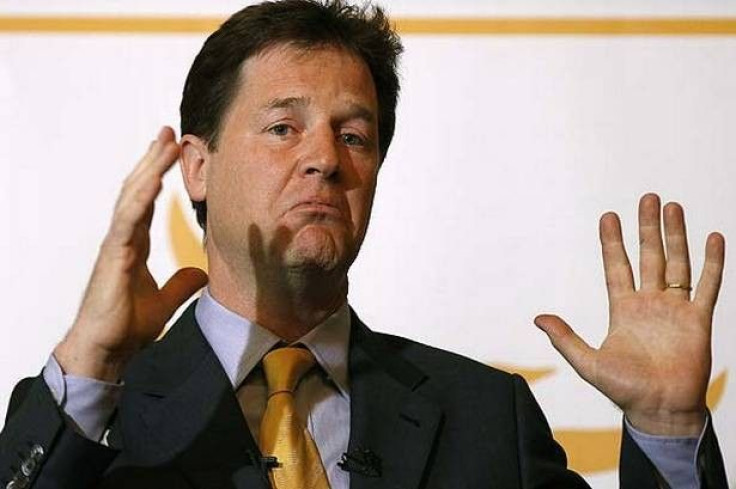Tax The Rich More? Great Britain Now Weighing An American Question

According to the average American, the wealthy ought to be paying more taxes.
Those are the results of a poll released by the Pew Research Center this week. Nearly six out of every 10 people surveyed said that the rich paid too little in taxes -- only 8 percent of respondents thought the wealthy paid too much.
This should be of interest to Republican presidential candidate Mitt Romney and incumbent Democrat Barack Obama, whose economic policies are at odds over this issue.
It would also be of interest to the people across the pond, where a very similar conversation is taking place.
Great Britain, whose economy is even worse than that of the United States, is desperate to break free of its years-long, double-dipping recession. This week, new taxes on the UK's wealthiest emerged as a potential plank in the official platform of the Liberal Democrats, who share a coalition government with the Conservative party at Westminster.
The issue is generating some fierce debates that rival the ones already raging in the United States.
On the Verge
In America, the upcoming election has raised the din of fiscal bickering to a fever pitch.
Obama's budget plan for fiscal year 2013 would raise about $1.5 trillion over 10 years by allowing the Bush-era tax cuts on the wealthiest Americans (those who make more than $250,000 a year) to expire, as they are scheduled to do in January, and by eliminating some tax loopholes for large corporations. The added revenue would go mostly to infrastructure and job creation initiatives.
Republicans do not want to raise taxes on the wealthy, instead favoring spending cuts that would restructure social welfare programs. Taxing the rich, they argue, would drive business from the country and de-incentivize job creators.
The dreaded "fiscal cliff," a term coined by Federal Reserve Chairman Ben Bernanke, raises the stakes in this debate. If Republicans and Democrats cannot come to an agreement in time, the massive 2013 spending cuts that were made mandatory in the debt ceiling deal of 2011, combined with the expiration of all Bush-era tax cuts, could plunge the country into another recession.
As the November presidential election draws nearer, American voters face a stark difference in economic policy -- and tax codes for the wealthy are one of the most divisive issues. Their choice will serve as the ultimate referendum on whether or not the rich are paying too much or not enough.
'Rough Waters'
That very same issue became a major talking point in the United Kingdom on Tuesday, when Deputy Prime Minister Nick Clegg gave an interview to the Guardian in which he called for more taxes on the country's wealthiest.
"If we are going to ask people for more sacrifices over a longer period of time, a longer period of belt tightening as a country, then we just have to make sure that people see it is being done as fairly and as progressively as possible," he said.
His plans involve taxing held wealth, not income -- Clegg and fellow Liberal Democrats do not plan to raise the top-bracket tax rate of 45 percent.
This would be a temporary solution to address Britain's double-dip recession. Belts are tight from London to Liverpool, and about to get tighter -- this month, the Bank of England amended its growth forecast, predicting an even slower recovery than previously thought.
Mervyn A. King, the bank's governor, explained that England's economic output still refused to rise after two years of stagnation. "We're navigating through rough waters, and storm clouds continue to roll in from the euro area," he said.
The country is has struggled to facilitate growth as the euro crisis drags on across the Channel. Unlike the United States, which pursued a stimulus-based approach to the 2008 recession and is now on track for a slow recovery, the United Kingdom opted for austerity, slashing spending and raising taxes across the board in hopes of keeping the deficit down and encouraging investments.
Political Posturing
Comparing Great Britain's situation with that of the United States, it seems that England's experiment with austerity has been a wash. Clegg's suggestion to raise taxes on the rich will likely be welcomed by many of the country's liberals -- but several conservative MPs aren't buying it.
"This is Nick Clegg saying let's try out a few ideas before party conference, probably will cheer up a few Lib Dems to talk about it. But it isn't government policy," said Conservative parliamentarian Mary Macleod, referring to a Liberal Democrat conference scheduled for next month in Brighton.
Bernard Jenkin, also a Conservative MP, agreed.
"I think most rich people are contributing far more in tax than other people," he said to the BBC. "I know this is not a fashionable view, but if you go on raising tax on rich people... you drive wealth abroad. This is a pre-conference, easy-clap line."
But Clegg can be counted on to keep up the rhetoric at least until the party conference -- even though his proposal has slim chances of passing Parliament.
"What we are embarked on is in some senses a longer economic war rather than a short economic battle," he said.
© Copyright IBTimes 2024. All rights reserved.












